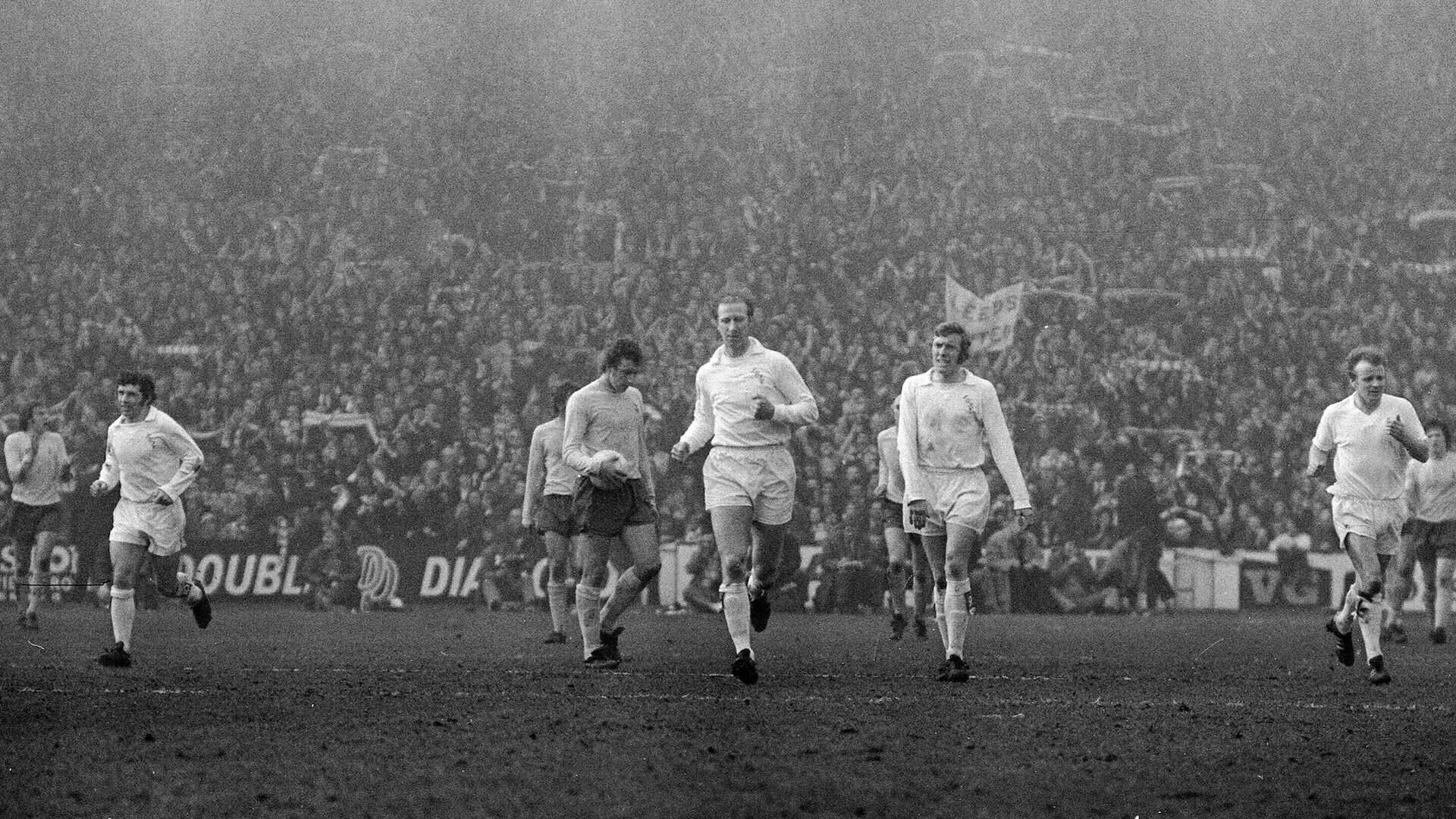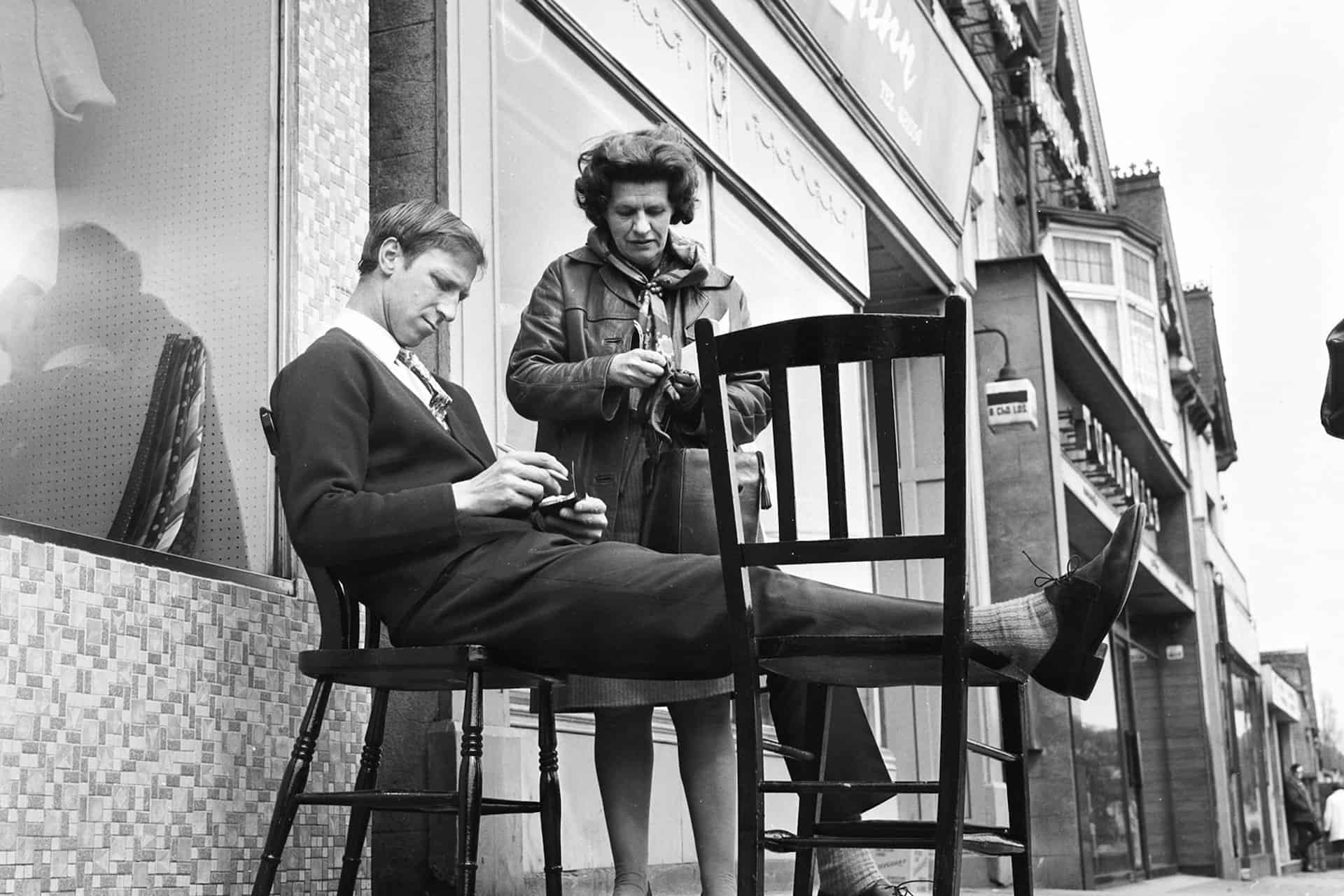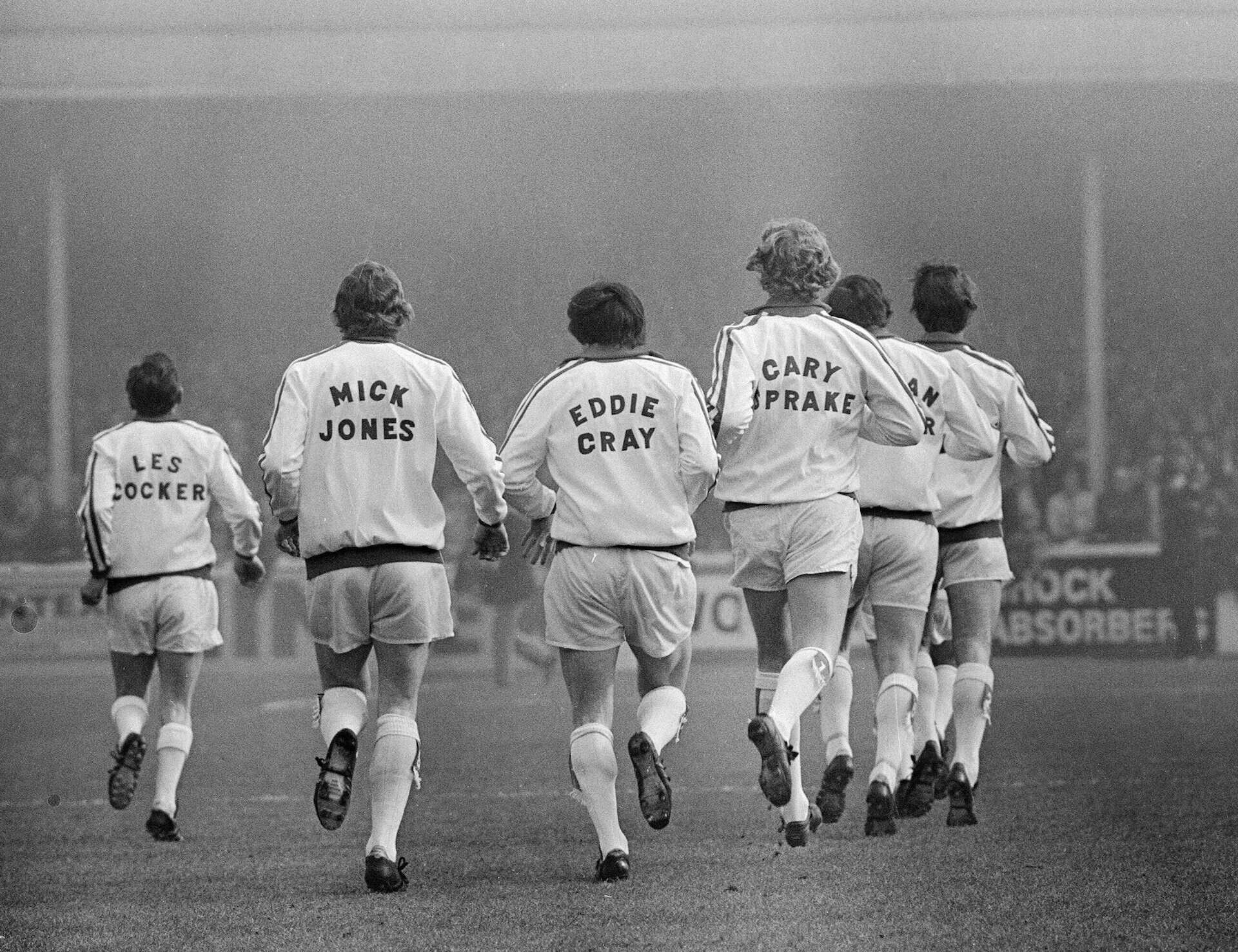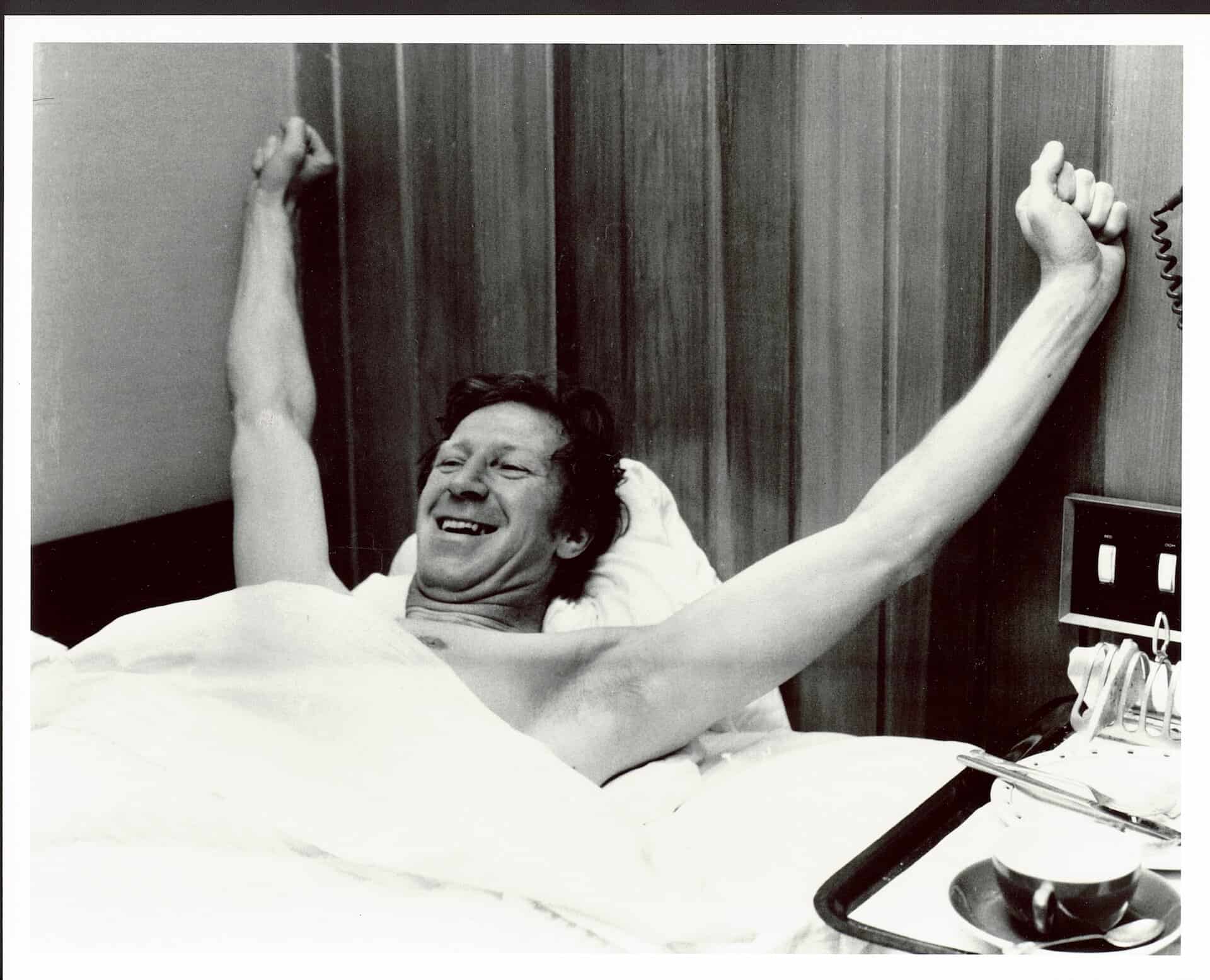FA Cup quarter-final, 1972: Leeds United 2-1 Tottenham — Square Ball 18/3/25
Different Class
Written by: Rob Conlon
After scoring twelve goals in their previous two league
victories, Leeds beat Coventry by a more modest 1-0 ahead of their FA Cup
quarter-final with Tottenham. The Coventry side featured Jeff Blockley, the
defender Leeds were rumoured to be interested in signing as Jack Charlton’s
long-term successor. Blockley was overshadowed by Big Jack, who celebrated 600
appearances and twenty years at Leeds by scoring the winner. Coventry chairman
Derrick Robins, who Don Revie wanted to speak to after being accused of making
an illegal approach for Blockley, came back from his holiday in Barbados and
sacked manager Noel Cantwell.
Martin Buchan, the Aberdeen centre-back also linked with
Leeds, was signed by Manchester United instead. When asked why he hadn’t waited
to see if he could join Leeds in the summer, Buchan replied, “I felt that it
might be at least two years before I got the chance to establish myself at
Elland Road, whereas I was assured of a first team place with Manchester United
right away.” Charlton had recently signed a new two-year deal at Leeds, and
Buchan clearly didn’t fancy his chances usurping a man fourteen years his
senior.
Charlton was still desperate to win the FA Cup to emulate
his little brother Bobby, but as he approached his 37th birthday, he was
determined to be defined by a different legacy. On a visit to his native
north-east the following month, where he spoke to local coaches at the Wallsend
Sports Centre, Charlton told journalist Ken Gorman:
“I don’t base a particular player’s success on how much metal he’s managed to gather. Take the World Cup winner’s medal — I’ve looked at it about twice since 1966. The one thing I’d hate when I retire is to be remembered as Jack Charlton, the man who won this and that honour, and no one can remember which club I played for. I’d love to be remembered as Jack Charlton, who played for Leeds — the team of the Seventies.”
In the build-up to the quarter-final, stories started
emerging in the press that Leeds were taking the advice of a public relations
company, wanting to improve their image and reputation. Don Revie wanted to
escape the Dirty Leeds tag so his players could be appreciated as the stars
they were, not just by the wider public, but in Leeds itself, which remained a
city dominated by rugby league clubs. Revie denied using a PR firm “in a proper
sense”, telling the Yorkshire Post: “This is an individual who gives us some
guidance.”
That individual was revealed to the writer Hunter Davies,
who was shadowing Tottenham for his book The Glory Game, spending time with the
team at training, on journeys around the country, and in the dressing room.
Staying with the team at The Queen’s Hotel in Leeds on the eve of the cup tie,
Davies spotted Spurs duo Pat Jennings and Steve Perryman chatting to two men
trying to convince them to use their names for sponsorship. Davies recognised
one of those men as the artist, entrepreneur, and raconteur Paul Trevillion.
Jennings and Perryman were envious of teammate Phil Beal,
who was the only Spurs player to be part of The Clan, a group of seven stars
from clubs around the country who had been photographed for newspapers wearing
‘frilly shirts, smoking cigars, and trying hard to look like swingers’. The
idea was that the publicity would lead to sponsorship deals for members of The
Clan. Trevillion explained why it was a bad idea. “They’ve gone for the wrong
image, concentrating on being swingers and chasing birds. That’s going to put
the mums off. It’s the mums who buy most football shirts and tracksuits. The
Clan should stick to its image as footballers. Nothing else.”
Sitting with the Tottenham players on the short bus journey
to Elland Road, Hunter Davies noticed Bill Nicholson encouraging Martin Chivers
while the England striker was ‘grimly looking out of the window’. As the
players were inspecting the pitch, he spotted goalkeeper Pat Jennings’ hands
were ‘visibly shaking’. Back in the dressing room, ‘it was the first time I’d
been consciously aware of the Spurs team worrying about their opponents,’
Davies wrote. Nicholson had already told his players not to worry if they lost
2-0. He was being optimistic. Billy Bremner told his teammates he wanted to win
by three.
Part of the theory behind Leeds’ football becoming more
expansive and entertaining under Don Revie was that the players had stopped
paying attention to his in-depth dossiers on the opposition. Peter Lorimer in
particular loathed them. ‘Such was the detail in his analysis of players we
were up against that he could make Hartlepool United sound like Real Madrid,’
he wrote in his autobiography. ‘By and large you wouldn’t be nervous when you
sat down to listen to him, but by the time he’d finished you’d be on the verge
of collapse with fear. He’d make the full-back marking me sound like the
world’s best defender, but five minutes into the game you’d discover he was the
tosser you always thought he was before Don planted his seeds of doubt.’
But the players that were still attentive would have noticed
a change in Revie’s messaging. Back at The Queen’s hotel, Davies bumped into
‘one of the Leeds spies’, who had watched Spurs three times in recent weeks.
Revie hadn’t asked him to report on Tottenham’s strengths, he only wanted to
hear about their weaknesses. Their team was full of internationals and a World
Cup winner in Martin Peters, yet ‘each Spurs player sounded like a condemned
man about to be sentenced for life’.
The silence of Spurs’ dressing room was interrupted by the
sound of the Leeds squad taking to the pitch fifteen minutes early. As United’s
players walked out, they looked at the sign hanging on the door for one last
time. ‘Keep Fighting.’ The next thing Tottenham’s players heard was the roar of
a sold-out Elland Road.
Leeds sprinted in formation to the far corner of the ground
and started performing aerobic exercises in unison. They split into groups of
four to perform the routine in front of fans in every section of the stadium,
who could identify each player by the name on the back of their gleaming white
tracksuit top. After their group drills, the players began individual routines
designed to show off their unique skills. Lorimer, known as one of the most
powerful strikers of a ball in the game, practised shooting from the halfway
line as he had tried at Anfield. He scored with all three attempts. John Giles
displayed his supreme control by keeping the ball in the air while the crowd
counted along. Gary Sprake showed off his reflexes by throwing a ball against
the post and catching it every time, no matter which direction it bounced.
‘They radiated confidence and fitness,’ wrote Davies, ‘and
the crowd went wild with excitement.’
Meet Super Leeds.
One of the biggest cheers during the warm-up came when the
crowd saw how high Jack Charlton could jump. But being asked to wear the
tracksuit top interrupted Charlton’s usual pre-match routine, and he forgot to
put on his playing shirt. When the game kicked off, a member of Leeds’ staff
had to rush back to the changing room while Big Jack played the first couple of
minutes in a vest.
Paul Trevillion’s plan worked. The atmosphere generated
among the supporters continued into the game as Leeds tore into Spurs from the
opening whistle. Three chances were created for Mick Jones alone, but Pat
Jennings was at his best to deny the striker. Terry Cooper forced another
fingertip save. Eddie Gray hit the bar with a header. Allan Clarke shot wide
and flashed another ball across the goalline. Peter Lorimer, Johnny Giles, and
Gray had played in a testimonial for former Manchester United and Preston
player Nobby Lawton three days earlier, but Spurs were unable to cope with
their intensity.
Half an hour in, Peter Lorimer was injured by a hard tackle
from Cyril Knowles. Billy Bremner responded by clashing with Phil Beal, after
which he was wiped out by Knowles. As Bremner lay on the floor, defender Mike
England walked over to pick him up, accusing Leeds’ captain of feigning injury.
That sparked a free for all among the two teams, resulting in bookings for
Bremner and England.
Leeds continued creating chances, Gray attempting to chip
Jennings and Clarke hitting the woodwork. Yet shortly before half-time, John
Pratt launched a hopeful cross into Leeds’ penalty area from the touchline, and
as Martin Chivers jumped for the ball with Charlton and Norman Hunter, Gary
Sprake was left unsighted. The cross bypassed them all, and the ball bounced
scruffily into the far corner. Leeds were trailing in the FA Cup for the first
time all season.
As if proving they were playing with Tottenham all along,
Leeds found the time to equalise before the break. They were playing with verve
and style, but needed ‘Sniffer’ Clarke to live up to his nickname, latching
onto a ball that was ricocheting around the penalty area, turning and shooting
into the bottom corner.
Early in the second half Sprake needed Norman Hunter’s help
to clear danger after rushing to his penalty spot to claim a free-kick but
missing the ball. It was the closest Tottenham got to scoring a second. Lorimer
headed another chance over, before a trademark surge from Cooper down the left
wing drew a foul at the edge of Spurs’ box. Bremner lazily chipped in a cross,
where his roommate and partner in crime Charlton got the run on Tottenham’s
defenders and calmly nodded the ball into the far corner. A goal as casual as
breakfast in bed.
Leeds didn’t relent. A Paul Madeley cross led to pinball in Spurs’ area, while Jennings made another fine save from Jones. The final whistle confirmed Tottenham had escaped with a 2-1 defeat, described by Eric Todd in The Guardian as a ’nonsensical margin’. While the Leeds players celebrated by gifting fans their pre-autographed sock tags, the Spurs dressing room was full of players arguing over who should have been marking Charlton for the winner. Eventually, full-back Ray Evans said something they could all agree on. “They’re a different class.”
Don Revie had wanted his team to be loved for so long, and
Super Leeds had finally earned the admiration of the country. In The Guardian,
Leeds were described by Eric Todd as ‘irresistible’: ‘They have some
outstanding individuals — Madeley alone is worth £300,000 of anybody’s money.’
In The Observer, Hugh McIlvaney lauded Leeds’ football as ‘breathtaking in its
scope and fluency, alive with dazzling improvisations… the full intimidating
depth of their quality was never more manifest than in those early minutes.
There was scarcely a weakness to be seen and excellence was everywhere.’
Sam Bolton, a Leeds director who was also the chairman of an
FA Committee, was due to make the draw for the semi-finals. He was asked who he
would like Leeds to play, smiled, and replied: “It doesn’t really matter, does
it?” The Yorkshire Post’s Eric Brindle agreed: ‘After the rout of Tottenham
Hotspur, they should be a short price bet for the Boat Race, the Grand National
and the British Grand Prix (on foot), let alone the Cup.’
On the crowd’s response to Paul Trevillion’s ideas for the
pre-match warm-up, Don Revie said:
“Obviously we shall change our routine and it is our
intention to let the fans see what individual skills we possess in all
departments of the game. In addition, we shall continue to give away the
autographed stocking tabs after each game.
“In other words, we hope to make the fans feel as important
to us as we hope the team are to them. We have a great team here and we have
some fine supporters, too, so anything we can do to forge closer links between
the two we shall attempt. Supporters are very much a part of any club, and it
is important that they feel this. After all, they are the people who pay us our
wages, and I think it is important that they associate themselves with the
players.”
The transformation into Super Leeds and performances against
Manchester United, Southampton, and Tottenham gave Revie the comparisons to
Real Madrid he yearned for since changing Leeds’ kit to all white. Peter
Lorimer, however, was not convinced by the comparison to Real. ‘I disagree with
manager Don Revie when he says Leeds are as good as Real Madrid in their pomp,’
he wrote in a newspaper column. ‘WE ARE BETTER!’



